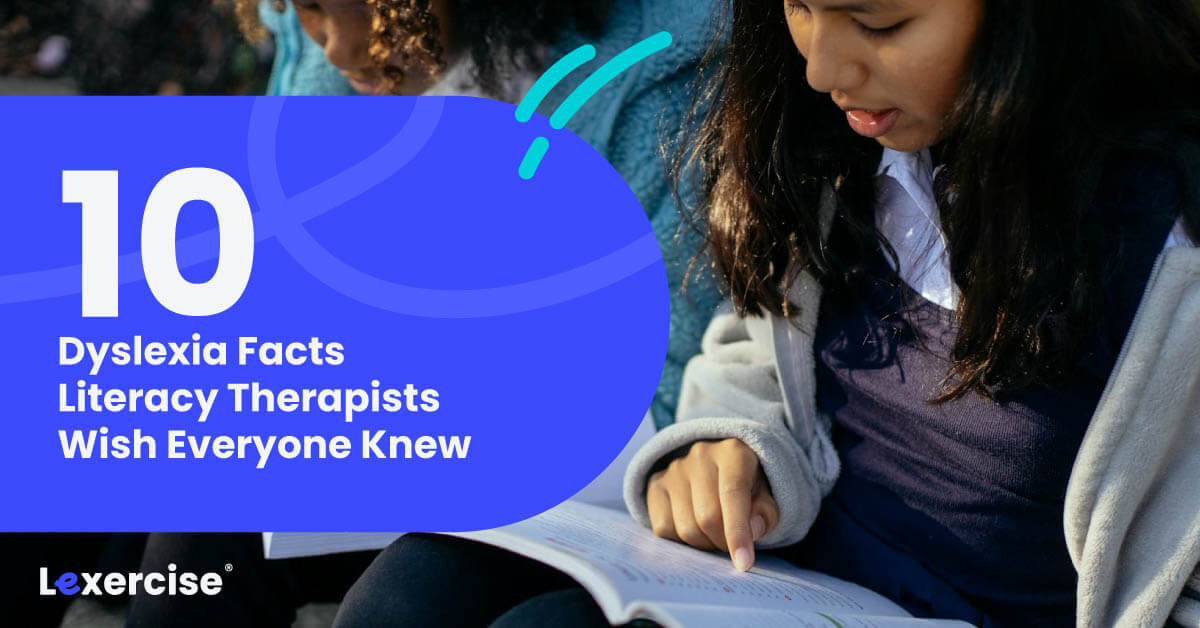10 Dyslexia Facts Literacy Therapists Wish Everyone Knew
Written by Tori Whaley
Published on September 26, 2014

Learning Ally recently published a terrific list of ten things parents of children with dyslexia wish others knew, which inspired me to come up with a list of my own: “10 Dyslexia Facts Literacy Therapists Wish Everyone Knew.”
1. People with dyslexia are born with dyslexia.
Evidence suggests that people with dyslexia are born with neurological differences that show up when they begin to learn to read. Because it begins so early, its symptoms can be recognized and treatment can begin at the same time as literacy instruction.

2. The symptoms aren’t always what you think they are.
“I never saw her reverse b and d!” “He loves listening to books and would sit and read along when he was young!” Sometimes parents and teachers don’t recognize dyslexia because it doesn’t look like they expect it to. While some people with dyslexia really struggle with reversals of letters and numbers, not all do. Other signs your child might have dyslexia include:
- Substitutes words in sentences for other words that make sense
- Memorizes words but cannot sound them out
- Does well on spelling tests but struggles with the same words a week later
3. Even if a teacher says your child is reading on grade level, she still may have dyslexia.
Teachers use all kinds of assessments to determine a child’s grade level. Some of these tests have a stronger research base than others, and some miss identifying symptoms of dyslexia altogether because of the way they define “on grade level.”

4. You can’t count on your school to treat your child’s dyslexia.
Teaching kids with dyslexia to read sounds like it should be your school’s job. But time and time again we hear about the struggles parents have getting appropriate literacy services from school. While parents should advocate for improvements in the system, the wait time for that type of improvement can be precious years of your child’s life.
Learning Ally recently published a terrific list of ten things parents of children with dyslexia wish others knew, which inspired me to come up with a list of my own: “10 Dyslexia Facts Literacy Therapists Wish Everyone Knew.”
5. The school’s testing for learning disabilities is not the same as a dyslexia evaluation.
Even if you beat the odds and are able to get an evaluation from the school, it still may not help!
Schools typically administer two types of testing: (1) a broad achievement battery and (2) an intellectual battery. The problem is children with dyslexia who are also very bright may score in the “average” range on both of these assessments, so their dyslexia goes undetected.
What we are looking for with dyslexia, especially in lower elementary grades, is not just whether a child is able to read words on the page, but what strategies he or she is using. Kids who memorize words may appear to be average readers, but when the demands of reading increase (typically in upper elementary or middle school) the holes in their foundations cause them serious problems. Those kids need help too, even though they may not qualify for school services according to their assessment.
6. Accommodations are not the same thing as instruction.
Once you have a dyslexia diagnosis, your child may be eligible for a 504 plan. This plan is designed to improve your child’s access to the general education curriculum and may include accommodations such as extended time on tests or having test items read aloud. While such accommodations might improve your child’s grades, they are not a replacement for intervention! Accommodations will not teach your child to read or spell.
7. Start the right interventions early to prevent academic and emotional problems.
Have you ever read about how much easier it is to learn a second language when you are young? The same is true for reading! If your school is resistant to providing the services your child needs, don’t wait for them to get on board. You may have to pay for the services now, but the cost of waiting may be far higher.
- First, the financial cost increases when children get older because it may take them longer to master the skills.
- More importantly, there is a deep emotional cost on your child of not learning to read at a young age. Ongoing struggles in school may lead your child to conclude that he or she is dumb, that school and reading are for other people and that there is no point in trying. This accounts for the increased rate of depression and anxiety in people with dyslexia.
8. The program is less important than the person delivering it.
Parents often ask, “What is a good curriculum for children with dyslexia?”—either so they can (a) purchase it and teach it themselves or (b) demand that their school purchase it. Using research-based instruction materials is vital, but it is not enough. Each dyslexic has a different combination of literacy and emotional issues that need individual, expert attention. That means that even if a curriculum is delivered exactly as prescribed, this one-size-fits-all approach cannot meet the needs of all children.
9. The way a program is delivered is as important as the program itself.
Even if your school has purchased a high quality, Orton-Gillingham based, structured literacy program and trained teachers to deliver it, your child may not get his or her needs met. The following aspects of a treatment program are particularly critical and under-served:
- One-on-one attention: Schools rarely deliver instruction in very small groups or one-to-one, which research shows is how it’s most effective.
- Repetition: Students need repeated “at bats” to practice these skills, as well as immediate, specific error correction.
- Individualized pacing: Effective dyslexia intervention moves at a pace that is individualized for each student, and that is hard to do in a group setting. Schools often feel pressure to close the gap as swiftly as possible and thus move at a pace that is too fast for some children.
- Motivation: Intervention delivered during the school day often comes at the expense of another subject. When a child has to miss a subject she enjoys and is motivated by to attend reading intervention, the intervention is naturally resented and thus less effective.
10. You’re going to make it!
Every time I deliver a diagnosis, I want to accompany it with a pep talk and a hug! By the time most kids are identified, both they and their parents have been through the wringer. I wish I could say it’s all smooth sailing from there, but for too many, it’s just the start of the battle. Still, people with dyslexia are succeeding all the time in just about any and every profession you can think of. They are doctors, lawyers, politicians, artists, entrepreneurs, and innovators. All of the brilliance and potential you see in your child is exactly what our world needs, and there is no good reason to allow dyslexia to take that away. Your child has talents and strengths that run deeper than dyslexia, and there is light at the end of the tunnel. You can make it!
If you’d like more information about your child’s reading difficulties, I’d recommend taking this free online dyslexia test our team built to help parents quickly identify if their child may be at risk for dyslexia.
Images courtesy of Pexels.com
Header:
Photo by Mary Taylor from Pexels: https://www.pexels.com/photo/crop-concentrated-schoolgirls-reading-textbook-in-park-5896515/
Photo 1:
Photo by Bhupindra International Public School from Pexels: https://www.pexels.com/photo/young-girl-engaging-in-classroom-activity-31864402/
Photo 2:
Photo by RDNE Stock project from Pexels: https://www.pexels.com/photo/woman-in-white-long-sleeve-shirt-sitting-beside-woman-holding-orange-pencil-8500424/
Photo 3:
Photo by Katerina Holmes from Pexels: https://www.pexels.com/photo/crop-kids-doing-homework-together-5905841/
Improve Your Child’s Reading
Learn more about Lexercise today.
Schedule a FREE
15-minute consultation

